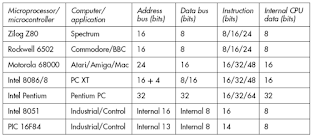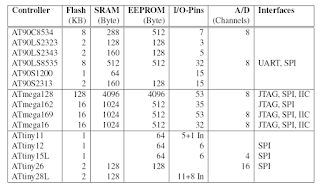Microprocessors and Microcontrollers
Here
we will summarize our discussion about the structural point of view on the
microcontrollers and microprocessor. In last some post we have detailed
discussed the computers, microprocessors and microcontrollers. As we know that
the Microcontrollers store their program code to be executed inside the MCU in
the form of binary numbers which are actually the voltage levels of +5V and 0V
to represent binary levels 1 and 0. The programs and software all uses the data
in only two digits 1 or 0. One digit either 1 or 0 is called one bit and 8 such
bits tighter are called byte. The program of microcontroller is normally stored
in non-volatile ROM which is executed depending upon the information sequencing
in set of instruction written in that program. The processor or CPU of
microcontroller then operates the input or output devices attached in project
and also stored data.
Now
we will discuss the data processing capabilities of microcontrollers and
microprocessors. The microprocessors while processing the data in execution of
software or programs, usually execute these bits together. Some of the
microprocessor are powered enough to handle the data 8 bits tighter and some do
16 bits together. The larger
microprocessors can handle the code in 8-bit binary words, or multiples of 8
bits. The two bytes tighter is called one word or data word. The data word size
has increased with the passage of time as advancements in this field is
continuous which also increase the complexity of the integrated circuits too. The
capacity of execution of various microprocessors is discussed in the table
below; here are these some examples because actual number of microprocessor is
very much more.
The
first generation of microprocessor based PCs popular as home computers were
like the Commodore, Apple, BBC and Spectrum used 8-bit microprocessors. In
these computers the information comprising of program and data words all of
these were 8-bit based. Then the second generation of computers came like home
games machines such as the Atari and Amiga. The second generation computers
used the 16-bit word and mostly use the 68000 chip processor inside these
computers. Similar kind of processor was also used in the Apple Mac. It may be
noted that it was the first mass-produced computer to use a WIMP interface.
On
the other hand the IBM PC which was a business-oriented personal computer. The
IBM PC was designed to use the Intel 8088 processor. At that time the 8088
Intel processor could handle 16 bits inside the CPU on motherboard and only 8
bits external interfaces. Similarly the Intel processor also went through many
developments and then it can load the 32-bit and or 64 bit together in the very
much pronounced Pentium processor series which is continue still. The power of
microprocessor not only increased in the way said earlier like execution of
information in more bits together but also in the term of clock speed.
Now we should come back to our microcontroller perspective. The advancements in microcontroller was also done with the passage of time. Initially the microcontrollers were 8bits processing but later on the microcontrollers were designed to handle the number of more bits at the same time. Historically saying that, the Intel 8051, Intel MCS-51, was one of the first widely used microcontrollers. It was designed to work 8bit processing mode. It is well established in the industrial control market and automation of may machines. Then the PIC family came, it is challenging for the position of leading microcontroller type. It was manufactured by Microchip. It was launched with some additional feature at that time like easily re-programmable feature was very good for beginners.
Now by
going through this whole discussion in this post and earlier posts, we hope it
is easily convinced that the microcontrollers are very good to use for control
application anywhere in general and in industry as well. Rest is that the only question
remain arises is that which microcontroller may be used for a specific
application to solve a problem. There are many factors which involves in
addressing this very important question regarding the selection of the
microcontroller for a certain task. In which the factor of costs is really very
important. To select the cheapest device is of course logical, but it must
match the application’s needs. Now a days it is learnt that the
microcontrollers are tailored for specific applications too. However there is a
wide variety of microcontrollers available in market to choose from.
 |
| various microprocessor characteristics comparison |
Now
we start it in a sequence, like first of all one should select the controller
family means the vener or manufacture which more associated with the
controller’s architecture. It may be noted that the microcontrollers a family controller
contain the same processor core. These are code-compatible generally. The
difference would be in the additional components/ feature like the number of
timers or the amount of memory, PWM, USART, IOs etc. The different controller
families like 8051, PIC, HC, ARM are as an example of good choice.
Figure Comparison of AVR 8-bit Microcontrollers specifications AVR, ATmega, ATtiny, Intel MCS-51.
In
the above table the data shows a selection of microcontrollers of Atmel’s AVR
family. The thing all these microcontrollers have common is their AVR processor
core. This family has 32 general purpose registers and executes most
instructions within one clock cycle.
The
next step is to choose the right microcontroller for the application under
consideration within the selected family of microcontroller. Here the choice of
microcontroller number wil be based upon the most basic features of the microcontrollers
for example memory, digital and analog I/O, and interfaces, Timers, Interrupts,
PWMs, USARTs etc. The chosen microcontroller will cover the hardware
requirements of the application along with to estimate the application’s speed.








No comments:
Post a Comment
Please ask if you have any question regarding the programming of MCU, or have any problem in development of your electronics project. microcontroller51.blogspot.com